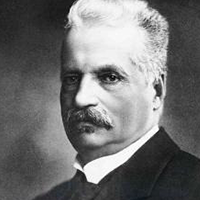Johan August Brinell
August Brinell was a Swedish Metallurgical Engineer. Brinell is noted as the creator of a method for quantifying the surface hardness of materials, now known as the Brinell hardness test. His name is also commemorated in the description of a failure mechanism of material surfaces known as Brinelling.
Johan August Brinell, Swedish metallurgist who devised the Brinell hardness test, a rapid, nondestructive means of determining the hardness of metals.
The son of Johannes Månsson, a farmer, and Katarina Jonasdotter, Brinell graduated in 1871 from the technical school in Borås and was employed in the Swedish iron industry for some fifty years. From 1882 to 1903 he was chief engineer of the Fagersta Ironworks, where his most original scientific work was done. He was chief engineer of Jernkontoret, an iron industry association, from 1903 to 1914, and chairman of the board of Fagersta from 1915 to 1923. He was a member of the Swedish Academy of Science and the (British) Iron and Steel Institute; and he received the Polhem Medal in 1900, the Bessemer Medal in 1907, and an honorary Ph.D. from Uppsala in 1907, as well as many other awards.
In 1875 Brinell began his career as an engineer at the Lesjöfers Ironworks and in 1882 became chief engineer of the Fagersta Ironworks. While at Fagersta he studied the internal composition of steel during cooling and heating and devised his hardness test, which was displayed at the Paris Exhibition of 1900. The test is based on the measurement of the impression left by a small, hardened steel ball after it is pushed into the metal with a given force. With minor variations, his test remains in wide use.

Johan August Brinell
Date of Birth: 21 Jun 1849
Birth Place: Nässjö, Sweden
Proffession: Swedish engineer
Nationality: Sweden
Death: 17 November 1925, Stockholm, Sweden


